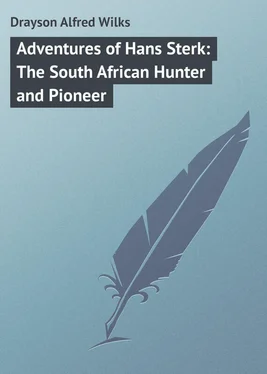Alfred Drayson - Adventures of Hans Sterk - The South African Hunter and Pioneer
Здесь есть возможность читать онлайн «Alfred Drayson - Adventures of Hans Sterk - The South African Hunter and Pioneer» — ознакомительный отрывок электронной книги совершенно бесплатно, а после прочтения отрывка купить полную версию. В некоторых случаях можно слушать аудио, скачать через торрент в формате fb2 и присутствует краткое содержание. Жанр: foreign_prose, на английском языке. Описание произведения, (предисловие) а так же отзывы посетителей доступны на портале библиотеки ЛибКат.
- Название:Adventures of Hans Sterk: The South African Hunter and Pioneer
- Автор:
- Жанр:
- Год:неизвестен
- ISBN:нет данных
- Рейтинг книги:3 / 5. Голосов: 1
-
Избранное:Добавить в избранное
- Отзывы:
-
Ваша оценка:
- 60
- 1
- 2
- 3
- 4
- 5
Adventures of Hans Sterk: The South African Hunter and Pioneer: краткое содержание, описание и аннотация
Предлагаем к чтению аннотацию, описание, краткое содержание или предисловие (зависит от того, что написал сам автор книги «Adventures of Hans Sterk: The South African Hunter and Pioneer»). Если вы не нашли необходимую информацию о книге — напишите в комментариях, мы постараемся отыскать её.
Adventures of Hans Sterk: The South African Hunter and Pioneer — читать онлайн ознакомительный отрывок
Ниже представлен текст книги, разбитый по страницам. Система сохранения места последней прочитанной страницы, позволяет с удобством читать онлайн бесплатно книгу «Adventures of Hans Sterk: The South African Hunter and Pioneer», без необходимости каждый раз заново искать на чём Вы остановились. Поставьте закладку, и сможете в любой момент перейти на страницу, на которой закончили чтение.
Интервал:
Закладка:
As soon as this boy’s report had been received, the Matabili chiefs concluded that the men had come either to act as spies, which was unlikely, or else for the purpose of rescuing the two girls. This latter supposition was considered the more probable by the experienced chiefs; and the ravine having been carefully surrounded by a large party of the Matabili, who, to avoid suspicion, left the kraals in parties of three or four only, a careful espionage was kept upon the two female prisoners, and Hans’ plot immediately discovered and guarded against, and preparations made for his capture and for that of his companions.
The prisoners were conducted to the kraal from which Katrine and her sister had escaped in the morning. The three men were placed in the hut, the door of which was closed, their hands tied behind them, and some half-dozen boys appointed to watch the hut from the exterior.
There are times when men of the greatest energy and enterprise fail in the attempts they are making to obtain certain results; these failures do not invariably occur in consequence of want of skill or care on the part of the men themselves, but seem to be the effect of some inscrutable power, which is often termed luck. When again and again such failures happen, we are accustomed to be thoroughly cast down, and to feel that no endeavours of our own can aid us: do what we may, think what we may, yet an evil luck will attend us, and failure must follow. These seasons of ill-luck or want of success may be the means used to teach us that man’s efforts alone can be but fruitless, and that it needs the assistance of higher powers to ensure success.
It was with a feeling of utter despair that Hans Sterk contemplated his late failure and his present pitiable condition. Like as a beaten chess-player reflects on the move which, if executed, might have saved him his game, so did Hans turn over every act and thought of the past, in order to find how he might have avoided his late failure; but the fact remained, that the enemy had been too crafty for him, and he too sanguine of success.
The hut in which he was a bound prisoner was like all the huts of the Kaffirs. It was constructed of strong wicker-work, and thatched with reeds and long grass; the door was merely a small wattled hurdle, and did not so entirely block the doorway as to prevent those outside from looking in; the walls were so thin that voices and conversation, even though carried on in a moderately low voice, could be heard from hut to hut. After the three prisoners had remained silent a short period, Hans said —
“Friends, I am very sorry that I have brought you into this state. We have tried our best, but we have failed: men can do no more than try.”
“We have been unlucky,” said Bernhard; “and most likely shall not see another sun rise, for the old chief must be furious at his losses lately, and may gratify his vengeance by seeing us assagied.”
“Don’t let us look at the worst,” said Victor; “we must think of escape; it is no use lying here like sheep to be taken, to the slaughter. I too believe we shall die to-morrow, but let us at least try to escape.”
“Rather difficult to escape, with our hands tied, and surrounded by enemies,” remarked Bernhard.
“Nothing is impossible to men with wits and nerve,” replied Hans; “and now I feel once more a man. Thank you, Victor, for giving me fresh strength by your remark, we will try to escape, and here is my plan: as soon as it is quite dark, we will free each other’s arms; this can be done by biting the withes and hide rope of one of us, then he who is free can liberate the others. See, in the roof there is an assagy, with this we can cut the fastenings as soon as one pair of hands are free. Next, one of us can go to the door and by some means attract the attention of the boys on watch, and bring them round to the front of the door; the other two can then work a way through this thin thatch and escape to the horses. The alarm need not be given at once; but if it should be, a run for life is better than nothing.”
“It would never succeed, Hans,” replied Victor: “the noise of breaking through the thatch would be too great; perhaps a better plan may occur to us if we think for awhile.”
The three men sat silently turning over every possible means of escape for nearly a quarter of an hour; but no idea seemed to be likely to be practically useful. As they were thus meditating, they heard a young Kaffir woman speaking to the boys who were on watch. She was laughing with them, and, from what the three prisoners could hear, she seemed to be rejoicing at their capture. At length she said, “I should like to throw some dirt at them, to let them know how little a Matabili maiden thinks of them.” And suiting the action to the words, she pushed aside the door, and, with a taunting laugh, threw a handful of earth at the prisoners. After a few words with the boys, she then withdrew, and all were again silent. A single term of abuse burst from the lips of Bernhard as a lump of clay struck him; and then, with a look of contempt at the door near which the Kaffir maiden had stood, he again racked his brain for some ideas which should aid him to escape.
Hans, who had been working his arms quietly but forcibly backwards and forwards for some time, suddenly withdrew one of his hands from the fastenings, exclaiming, – “So much for the tying of a Matabili! You can free yourselves in five minutes, if you strain your knots. Try what you can do.”
The two men thus addressed commenced straining their knots; which proceeding, however, was not as successful as had been that of Hans. The latter, however, by one or two cuts of the assagy soon liberated the arms of his companions, and, to their surprise, addressed them in a whisper as follows: —
“Soon after sunset we shall be free, so stretch your limbs, and be ready for a battle for life and freedom.”
“What is your plan, Hans?” said Victor; “let us hear.”
“It is not my plan; it is Katrine’s information. That ball of clay that the girl threw contained a roll of paper from Katrine. This is what she says: —
“‘An hour after sundown, there will not be a man in the kraal, only six boys to watch you and two old women to watch us. Free your arms and make your escape; then your guns are in the chief’s hut, the one with the large ox-horns over the doorway, the horses are in the kraal next the cow’s kraal: we will be ready. The girl who takes this I have won by presents. I leave to you, Hans, the plan: you may depend I tell you truth; I have learned all this from the girl.’”
“And that was in the clay ball,” exclaimed Victor. “Ah, Bernhard, we are but stupid hands on the spoor. Hans, after all, is the born leader. What made you think there was any thing in the ball, Hans?”
“I did not think the girl looked cruel,” replied Hans, “and she seemed acting a part as I looked at her.”
“Let us make our plans now. What do you propose, Hans?” inquired Victor.
“We will try my plan first, if that fail we will just rush out and drive off the boys, and so escape. I must find out where the men are all going to, for it depends on that where we ride to. Our horses may not be very fit for a journey, however, and as we shall certainly be followed, and our spoor will be as plain as a waggon-track, we must take care; for once again captured, we shall never have another chance. Ah, here comes the girl again.”
The Matabili girl again came to the door, and with a loud laugh threw in a handful of dirt which she had appeared to pick up from the cattle-kraal near. Amidst this heap was another lump of clay, from which Hans drew a piece of paper, and read, “I can give you no other weapons than three assagies, these will be pushed through your hut soon after sunset; look out for them and draw them in rapidly, so as not to be seen. We must first ride north . God help us!”
Читать дальшеИнтервал:
Закладка:
Похожие книги на «Adventures of Hans Sterk: The South African Hunter and Pioneer»
Представляем Вашему вниманию похожие книги на «Adventures of Hans Sterk: The South African Hunter and Pioneer» списком для выбора. Мы отобрали схожую по названию и смыслу литературу в надежде предоставить читателям больше вариантов отыскать новые, интересные, ещё непрочитанные произведения.
Обсуждение, отзывы о книге «Adventures of Hans Sterk: The South African Hunter and Pioneer» и просто собственные мнения читателей. Оставьте ваши комментарии, напишите, что Вы думаете о произведении, его смысле или главных героях. Укажите что конкретно понравилось, а что нет, и почему Вы так считаете.












